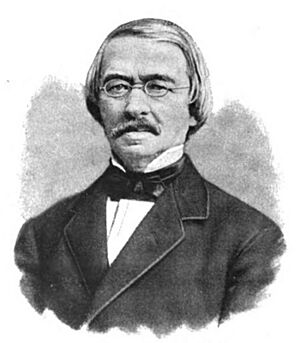Theodor Kullak facts for kids
Theodor Kullak (born September 12, 1818 – died March 1, 1882) was a talented German pianist, composer, and teacher. He was known for his skills at the piano and for helping many students become great musicians.
Early Life and Musical Start
Theodor Kullak was born in a town called Krotoschin (now Krotoszyn, Poland). He started learning piano at a young age with a teacher named Albrecht Agthe. When he was just eight years old, his piano skills caught the attention of Prince Anton Radziwill. This prince was very artistic and helped young Theodor.
In 1829, Prince Radziwill arranged for Theodor to perform in a concert in Berlin. He played alongside a famous singer named Henriette Sontag. The King, Frederick William IV, was so impressed that he gave Theodor thirty gold coins! After this, Theodor also played a successful concert in Breslau. Prince Radziwill then made sure Theodor received a good education, even paying for his school fees.
Later, Theodor lost the prince's support. From age thirteen to eighteen, he didn't have much access to a piano. At nineteen, his father wanted him to choose a practical job, so Theodor began studying medicine in Berlin. However, music was his true passion. A new friend, Count von Ingenheim, gave him some money to study music with teachers like Siegfried Dehn and Wilhelm Taubert. This count also helped him find wealthy students to teach. In 1842, King Frederick William IV gave Theodor money specifically for piano studies, showing how much his talent was valued.
Building a Musical Career
When he was 24, Theodor Kullak went to Vienna to continue his music education. He studied piano with Carl Czerny, a very famous piano teacher. He also learned music theory from Otto Nicolai and Simon Sechter. Other great musicians like Franz Liszt and Adolf von Henselt also inspired him.
In 1843, Kullak returned to Berlin. He got a job teaching piano to Princess Anna, the daughter of Prince Karl. This was just the beginning! Theodor became known for teaching many princes and princesses, as well as children from important families. People recognized his excellent teaching skills and good manners.
In 1844, Kullak started a music group in Berlin called the Tonkünstler-Verein and led it for many years. Two years later, at age twenty-eight, he was named the official Pianist to the Prussian Court. In 1850, he helped start the Berliner Musikschule (also known as the Kullak Institute) with Julius Stern and Adolf Bernhard Marx. However, after five years, Kullak left this school. It then became known as the Stern Conservatory.
In 1855, Kullak opened his own new school, the Neue Akademie der Tonkunst. This school was very successful and was often called "Kullak's Academy." It focused on training pianists and grew to be the largest private music school in all of Germany. By its 25th anniversary, it had 100 teachers and 1,100 students! In 1861, Kullak became a professor and received many other honors.
His son, Franz (1844–1913), also studied music at his father's academy. Franz later taught there and became the director after his father passed away in 1882.
Music and Influence
Theodor Kullak wrote a lot of music, especially for teaching piano. His book Die Schule des Oktavenspiels (The School of Octave Playing), published in 1848, is still very well known. He also composed a piano concerto (a piece for piano and orchestra) and two sonatas (pieces for one or two instruments). However, most of his other music is not played often today.
Kullak also helped edit and add notes to a 13-book collection of Frédéric Chopin's piano works. He also edited all the piano works of Felix Mendelssohn, including the famous Songs Without Words.
Many famous musicians were students of Theodor Kullak, including Moritz Moszkowski, Nikolai Rubinstein, and Xaver Scharwenka.
See also
 In Spanish: Theodor Kullak para niños
In Spanish: Theodor Kullak para niños
 | Georgia Louise Harris Brown |
 | Julian Abele |
 | Norma Merrick Sklarek |
 | William Sidney Pittman |


